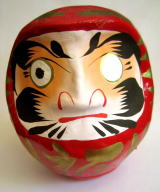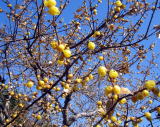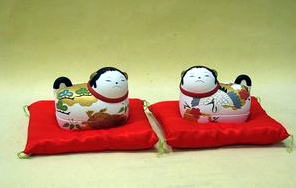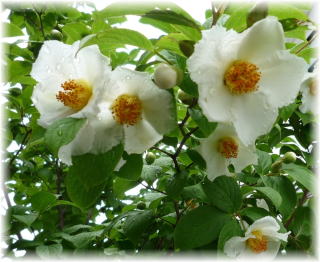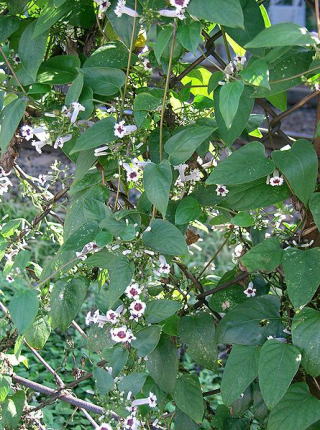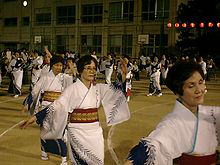| Ź┼ÅIŹXÉVō·(update)ü@'10.12.03 |
| 2010 |
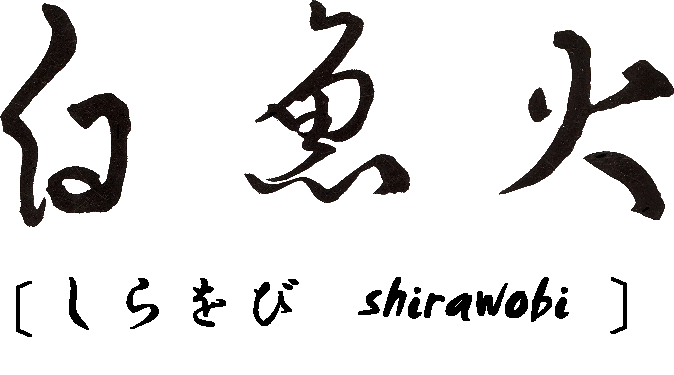 |
|
|
| é▒é▒é╔īfŹ┌é╠ŗÕé═öÆŗøē╬ÄÅé╠ügöÆŗøē╬ÅGŗÕühé╔īfŹ┌é│éĻéĮéÓé╠é╠ēp¢¾é┼éĘüB ¢|¢¾é═āzü[āĆāyü[āWÆSō¢Äę鬏sé┴é─éóé▄éĘé╠é┼üAŹņÄęé╠łėé╔ɧé▄é╚éóéŲé▒éļéŌ¢╝æOé╠ōŪé▌łßéóé╔é═Æ╝é«é╔æ╬ē×éĄé▄éĘüBāüü[āŗ |
| Shirawobi is the name of a Haiku magazine and an association of Haiku enthusiasts that has existed for fifty years in Shimane Prefecture, Japan. The following Haikus are written by the members of the Shirawobi group, selected by its chairperson Mr. Masafumi Nio, and rendered into English by its web-site editor. The words in the single brackets are Haikus in Japanese and those in double brackets are the authors' names. |
|
|
|
|
| Haikus Selected from '10 January edition of the Shirawobi |
| to '10January Japanese page |
|
|
| (Otogai no togaru shinpu ya nokongiku) ((Makizawa Sumie)) the monk has sharp chin ... flowers of aster yomena (Uragare no oka no Yakov no ne-baka kana) ((Kurebayashi Kouichi)) the half desolate hill... may Yakov rest in peace (Ai no hane mune ni shukuji no Seijyo joshi) ((Sakata Yoshiyasu)) wearing a red feather* on her breast, Madam Seijo* made welcome speech *Red feather is a sign of donation for "Red Feather Community Chest Campaign" in Japan in October. *Seijo: Ms. Seijyo Imai is one of Haiku poet in Shirawobi Haiku group. (Onbora* to kurasu shiawase hagi no hana) ((Katsube Asako)) I enjoy my slow-life-style*... bush clover's flowers *Slow-life -style is usually expressed as "Slow Movement" in the weastern countries. (Mi-hotori ni konshu-go ikutsu bunka no hi) ((Uetake Mineyuki)) Culture Day-- I found many cross-cultural coinages |
|
|
|
|
| Haikus Selected from '10 February edition of the Shirawobi |
||
| to '10February Japanese page | ||
|
|
||
| (Kutsu-himo wo shimuru tebukuro kuwae keri) ((Kimura Chikuu)) taking my gloves in my mouth, I tied my shoelaces (Mochiyori no takuan min-na chigau aji) ((Yoshimura Michiko)) each yellow pickled radishes each of us brought, has its home's taste (Ami-bou ni mahou wo kakete keito amu) ((Fujita Fumiko)) working magic to the knitting pins , she knits wool (Koharubi ya loupe wo hawa su kogojiten) ((Muramatsu Hisako)) Indian summer-- look up archaic word dictionary with loupe (Tamerawa zu hachinen-nikki motome keri) ((Ikeda Toki)) I never hesitated to buy an eight-year-diary (Fuyu-momiji kodakara no yu wo kumi kaeri) ((Mizude Motome)) winter red leaves-- I took kodakara-no-yu* to home *kodakara-no-yu: they say curtain hot spring water is good for having a baby. In this haiku, it may be Ikaho hot spring's in Gunma Prefecture (Hizashi koki lobby ni ore ba kotori kuru) ((Kinoshita Hitojyo)) I am in a lobby under the warm sunlight... small birds migrate (Naoe Kanetsugu kigae chuu nari kiku matsuri) ((Shibayama Yousaku)) chrysanthemum figure of Naoe Kanetsugu* is changing his clothes *Naoe Kanetsugu is a military commander in the Age of Civil War and whose drama was broadcasted by TV through 2009. (Nori-hibi ya umi yori hiroi yoshinogawa) ((Kujime Seishi)) nori-hibi*-- the mouth of Yoshino River looks like ocean *Nori-hibi is a trap to catch the spores of nori;seaweed and to grow in laver nursery, and it used to be made by twigs.
|
||
|
|
| Haikus Selected from '10 March edition of the Shirawobi |
|||
| to '10 March Japanese page | |||
|
|
|||
| (Konpeki no umi wo hikiyose tsuwa no hana) ((Ikeya Takahiko)) tsuwa flowers seem to attract the deep blue ocean
(Uekae ni hodoyoki shimeri kami kaeru) ((Deguchi Satsue) a light rain, suitable to plant saplings-- gods have returned* *They say that the gods of all shrines in Japan travel to Izumo shrine in Shimane prefecture to have meetings in November, then return to their shrines in December. (Kusame shi te yugami shi kao wo tate-naosu) ((Oomura Yasuko)) I sneezed and have the distorted face recovered (Hakusai no rugger okuri ni tsumi-aguru) ((Yamaguchi Akiwo)) we pass Chinese cabbages as rugby balls, then pile them up (Kobushi dasu Akagi aite ni kan-geiko) ((Amano Kousen)) we jab our fists to Mt. Akagi-- mid-winter training (Nukume-dori tsuma mo zetsumetsu-kigu-shu kana) ((Takahashi Kakou)) nukume-dori*-- my husband must be an endangered species *Nukume-dori is a legend of hawk's habit that hawk catches a small bird to keep hawk's claws warm in the cold evening, then release it alive in the morning. (Tori-kakaru made no ikunichi gajyou kaku) ((Takahashi Keiko how many days I spent to begin to write New Year Card (Chi ni fure nu mama kaze to naru ochiba kana) ((Furukawa Matsue)) a falling leaf did not land, and was in the air again (Hakuchou wo mi mu to futa-eki saki no machi) ((Noda Hiroko)) to see swans I took a train two stations away (Sanbyaku do mawaru shiro-fukurou no kubi) ((Hirano Takeko)) the neck of white owl can turn three hundred degree (Saiban no kaigan shitaru Daruma* kana) ((Tamura Fumijyo)) New Year's Eve-- the Daruma doll got its second eye at last *Eye-Painting Custom of Daruma doll: At New Year time, many Japanese individuals and corporations buy a Daruma doll, make a resolution, and then paint in one of the eyes. If, during the year, they are able to achieve their goal, they paint in the second eye to thank the Daruma for its divine help. At year end, it is customary to take the Daruma doll to a temple, where it is burned in a big bonfire.
|
|||
|
|
| Haikus Selected from '10 April edition of the Shirawobi |
||
| to '10 April Japanese page | ||
|
|
||
| (Kurayami ni match wo sure ba jyoya no kane) ((Gotou Masaharu)) when strike a match in the dark... jyoya-no-kane* ring out *jyoya-no-kane : the watch-night bell (Ganjitsu no mangetsu kumo wo yosetsuke zu) ((Deguchi Satsue)) the fullmoon of New Year's day kept clouds away (Senjin wa teoshi-pump no dezome-shiki) ((Igarashi Toujyuu)) the vanguard were hand-pumps... the New Year's parade of fire brigades (Timpani hibiku shuushou yuki fure ri) ((Kobayashi Fusako)) timpani sounded at the last movement... it snowed (Dangan to nari skier suberi-oru) ((Oono Shizue)) skiers of the downhill race look like bullets (Mizuumi no sae te minemine ake ni keri) ((Oosawa Noriko)) the lake was clear... and the mountains were at daybreak (Shimeri aru ichou-ochiba wo shiori to su) ((Nemoto Atsuko)) I use a wet ginkgo leave as a bookmarker (Niwa ni i te ichinichi aka zu botan no me) ((Kotou Hiroe)) I spent all day in my garden... peony's sprouts (Roubai no sakari garou no nigiwashiki) ((Maekawa Michiyo)) Japanese allspices are full bloom... an art gallery is full
(Atarashiki jacket wo ki te mune wo hare) ((Doi Yoshinori)) straighten yourself up with new jacket! |
||
|
|
| Haikus Selected from '10 May edition of the Shirawobi |
||
| to '10 May Japanese page | ||
|
|
||
| (Inubako wo hiina dougu ni kuwae keri) ((Hakata Miho)) I added a pair of inubako to the set of doll's festival
.*hina-matsuri:doll's festival is the Girl's festival by displaying hina (or hiina) to wish the little daughter's health. (Dou-en ni haruhi wo ukuru hiza-kozou) ((Watanabe Michiko) at the porch of a shrine-- the sun lights up a boy's kneecap (Organ wo nokoshi heikou ki no ne aku) ((Hirama Jyun-ichi)) closing down of school left an organ... thawing around the trunk (Yuuzutu wo sora ni harituku yokan kana) ((Tanaka Yuuki)) evening stars are stuck to the sky... the lingering cold (Gousetsu wo kaku beku asa no zekka-jyou) ((Takahashi Keiko)) to shovel away heavy snow... I take sublingual tablets by mouth in the morning (Yamaguni no setsubun-sou wa kaze no hana) ((Sibayama Yousaku)) Setsubun-sou in mountainous country seems to be wind's flower *Setsubun-sou is a wild flower and blooms in early spring. (Uguisu no koe osana kari ho-ho-ho-ho-ho) ((Torigoe Chinami)) the song of bush warbler is immature... ho-ho-ho-ho-ho (Sentei ya jikko ni tari nu aza zumai) ((Ooshiro Nobuaki)) pruning persimmon-- I live in a lonely village (Hiashi-nobu okuregachi-naru hana-dokei) ((Ootuska Sumie)) toward the end of January-- a flower clock tends to be late (Hoken-shitsu dai-ni-sotsugyou-shiki-jyou ni) ((Sugihara Kiyoshi)) the school infirmary became the second place for graduation ceremony |
||
|
|
| Haikus Selected from '10 June edition of the Shirawobi |
| to '10 June Japanese page |
|
|
| (Chichi no koe sokkuri morai sotsugyou su) ((Ooishi Masue)) his voice sounds just like his father's... graduation ceremony (Nohouzuna eda wo tsuzume te momo-sentei) ((Watanabe Harumine)) I prune away the disordered branches of peach tree (Hito-ashi de nori-okure taru hana no eki) ((Kotou Hiroe)) only a step I missed trains... cherries are blooming (Keichitsu* ya yururi to mekuru matsu no komo) ((Kimura Isa)) early in March the straw mat for pine tree's trunk is removed slowly *Keichitsu is one of 24 traditional seasons in Japan. The day is around Mach, 6; and they say that insects and animals are wake up from hebernation. (Otoko ni wa otoko no shitto oboro-zuki) ((Ensaka Kousaku)) men's jealousy is persistent too... hazy moon (Kusa-moyuru kawa wa chikara wo oto ni shite) ((Araki Chitoe)) fresh grasses sprout-- brook turns its power to the sound (Too-kiteki boufuu-rin no kinone aku) ((Takahashi Shizuka)) a faint train's whistle... lying snow is melted around the trunks of windbreak (Misora yori icchokusen ni hatsu-tsubame) ((Tanaka Ishi)) migrated swallows came down from the deep and blue sky (Na-no-hana ni mune terasare te kikyou se ri) ((Maruta Mamoru)) chesting out, I returned to my home... rape blossoms (Choukan wo mekuru te tomuru hatsu-ne kana) ((Wakabayashi Mayumi)) I stopped turning over a newspaper-- the song of bush warbler |
|
|
| Haikus Selected from '10 July edition of the Shirawobi |
| to '10 July Japanese page |
|
|
| (Ippuku no iboku no jiku ya matsu no shin) ((Suzuki Yuriko)) a hanging roll of calligraphy my father wrote... new pine needles (Ao-arashi iwa ni massugu atari keri) ((Aoki Ikuyo) green and strong wind hits the crag directly (Nijikai ni haha to duet haru fukashi) ((Nishida Mikiko)) mother and I sing a duet with karaoke ... late spring (Shunjyun wo kawa goto kogeru made yake ri) ((Kamo Kouichi)) I grilled bamboo shoots with their sheaths (Endou no saya ni aki-beya ari ni keri) ((Sone Suzue)) a shell of pea had an empty room (Chuubou ni otoko no hairu rikka kana) ((Takaha Katsuko)) the begining of summer-- my husband cooks in the kitchen *They say that men should not cook for their family in Japan in the past. (Sakuragi hirou hamabe ni mukashi ari) ((Ichikawa Yasue)) I gather cherry shells on the beach by recalling old days (Wasure-yuki asu wo shinji te kurashi ori) ((Maekawa Kimiyo)) last snow falls... I believe that I will be tomorrow (Hikari yori miki no hikare ru hana-kanba) ((Hamano Mayako)) the trunk is more brilliant than the sunlight... flowers of silver birch |
|
|
| Haikus Selected from '10 August edition of the Shirawobi |
| to '10 August Japanese page |
|
|
| (Sendan no hana murasaki no ame keburu) ((torigoe Chinami)) chinaberry flowers--- the rain is purplish and fogy (Kakei-zu ni on-na to ari nu hana-giboshi) ((Abe Fumiko)) woman was recorded just "female" in the family tree... plantain lilies (Sei gogatsu iki yasurakana ubugo daku) ((Ooyama Seishou)) holy May--- just born baby is sound (Hippatte matsuri no happi yakko-boshi) ((Matsushita Youko)) festival's happi is stretched and dried in T-shape (Koromogae jijyo no kurui te mama nara zu) ((Shibata Yoshie)) abnormal climate makes the time of koromogae* irregular *Koromogae: we change to a different set of clothing at the turn of the seasons in Japan. (Mushae-shi no fude no todomaru hi-kaminari) ((Igarashi Toujyuu)) a peal of thunder stopped the mushae*-painter painting *Mushae: a picture of samurai in combat (Tategami ni keshou shite ori kusakeiba) ((Nagao Kiyo)) the mane wore makeup... a local horse race (Genryuu wo tazune shinjyu no yama ni iru) ((Tanaka Yuuki)) I explore the source of the mountain covered with fresh verdure |
|
|
| Haikus Selected from '10 September edition of the Shirawobi |
||
| to '10 September Japanese page | ||
|
|
||
| (Joumon mo Yayoi mo haruka tamizu waku) ((Nishimura Matsuko)) the Jomon* and Yayoi* period are long time ago... water of rice field is hot *the Jomon period and the Yayoi period are the dawn ages of Japanese history. (Biwa ururu kyoukai no mon to wo okazu) ((Shibayama Yousaku) ripe loquat-- the gate of the chirch has no door (Kuu te mii ya tosa no katsuo no tataki ze yo) ((Gotou Masaharu)) Please eat tuna-tataki in Tosa* *Tosa is the old name of Kochi prefecture. (Sara no hana kasane shi toshi wo wasure keri) ((Nakada Hideko)) Sara- no-hana-- I forgot my old age
(Jyouzetsu na ojyuuji to ori ka no toriko) ((Bandou Noriko)) talkative budha priest made me to be a mosquitos' prey (Nantai ni mamuki semuki te taue kana) ((Masuyama Masako)) I plant rice facing and showing my back to Mt. Nantai (Tenteki no ichinichi nari shi ao-shigure) ((Yoshikawa Noriko)) received intravenous drip infusion whole day... ao-shigure* *Ao-shigure is a special word of Haiku: meaning that the drops from green leaves as if it is raining. (Chichi no hi ya chichi no shirazaru rokujyuu-dai) ((Shimizu Jyunko)) Father's Day-- my father passed away in his fifties |
||
|
|
| Haikus Selected from '10 October edition of the Shirawobi |
||
| to '10 October Japanese page | ||
|
|
||
| (Dainenbutsu wakaki otoko no fukurahagi) ((Satou Shouko)) Dai-nenbutsu*--- the calf of lad-dancer *Dai-nenbutsu or Enshu-dai-nenbutsu is a kind of Bon dancing in Hamamatsu area, shizuoka prefecture. (Shinde iro sarani koku se ri koganemushi) ((Deguchi Satsue)) the color of scarab beetle is deeper after died (Mazumazu wa shaba ni de taru zo dojyou-nabe) ((Hirama Jyun-ichi)) I got out of hospital somehow and ate loach-nabe* *Nabe is one-pot dish, cooked at the table (Nemu no hana saite Basho no kozan kana) ((Morii Kyouu)) silk tree blooms... at the home town of Basho (Hako-niwa no kusaya futatsu wo ai hedate) ((Morii Akie)) there is a small garden between two thatched-roof huts (Mizu sukoshi kobashi te sugi nu too-yudachi) ((Shinowara Shouji)) a distant shower gave little water to the earth, then left (Yaito-bana kinen shashin wa itsumo hashi) ((Takabe Muneo)) yaito-bana-- I always on the edge of commemorative photos
(Shuusenn ni no tte mi nai ka katatsumuri) ((Fuke Kouji)) will you try to play a swing, snail? (Jyuuichi mon no ashi no nozoku ya natsu noren) ((Takagi Toyoko)) feet:size eight and a half are seen under the shop curtain in summer |
||
|
|
| Haikus Selected from '10 November edition of the Shirawobi |
||
| to '10 November Japanese page | ||
|
|
||
| (Sandou wo fukiage te ki shi souki kana) ((Ikuma Akiko)) autumn breeze came up along the approach to the shrine (Kiseishi no ippa niha ki te ware nanpa) ((Yumiba Tadayoshi) first and second child's family came my home for the vacation in a row... I was tired (Mabataki mo se zu hitoiki ni ramune nomu) ((Fujie Ryouko)) I drink a bottle of lemonade in one gulp with unblinking eyes (Eshaku shite oyako de hairu odori no wa) ((Yoshida Tomoko)) making slight bow, my daughter and I join the ring of Bon dancing
(Chourou ni shaku sase te iru yoimatsuri) ((Suzuki Toshihisa)) the elders are serving sake to the lads... shrine-festival's eve (Ai-yukata kitsuke wa ima mo haha makase) ((Ishikawa Jyunko)) indigo blue yukata -- my old mother helps me get dressed (Hikimizu ni kurukuru hiyuru suika kana) ((Fukushima Fusako)) a watermelon spins and gets cool by the trough-water from mountain stream (Senkan to shizumi shi ani ni taku kadobi) ((Shinohara Yonejyo)) my brother had sunk in the ocean with battleship... I lit kadobi* *Kadobi is a small fire lit at the gate in the evening on the first/last day of the Bon Festival to welcome back/ see off departed souls. (Shuusenki sunawachi chichi no ki nari keri) ((Satou Isao)) anniversary of the end of World WarćU is just that of my father's death (Higurashi no michi wo massugu nougakubu) ((Matsubara Hajime)) the straight way to the agricultural faculty... cicadas are shrilling |
||
|
|
| Haikus Selected from '10 December edition of the Shirawobi |
| to '10 December Japanese page |
|
|
| (Kanetataki ichida ga kuchibi kiri ni keri) ((Oomura Yasuko)) a bush cricket started the chorus of autumn insects first (Nikuboso no honji nikki tsuzure-sase ) ((Oosumi Shigeyo)) cricket chirps... honjin* memo was written by fine writing brush *Honjin had been high-rank hotel for daimyo's procession in Edo era. (Tombou wa ourai jizai umi no seki) ((Ooshiro Nobuaki)) dragonflies were free to pass though the strict shipping barrier (Kai no ne ni awasu funa-uta mizu no aki) ((Okuno Tsuyako)) boatman's song harmonizes with the sound of oars... limped autumn river (Mokusei ya waki-honjin ni mon no nashi) ((Taguchi Kou)) fragrant olive-- waki-honjin* has no gate *Waki-Honjin had been subsidiary hotel for high-rank one for daimyo's procession in Edo era. (Terano na to aza no na hitotsu kotori kuru) ((Ooishi Masue)) migratory little birds-- village has the same name as the temple there (Hitotoki no hovering seru ina-suzume) ((Mitani Seiji)) sparrows in the rice field hovered for a while |
|
|
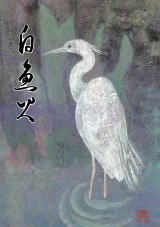
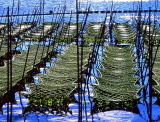
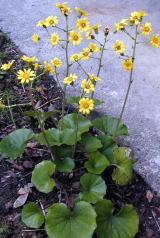 Tsuwa flowers
Tsuwa flowers